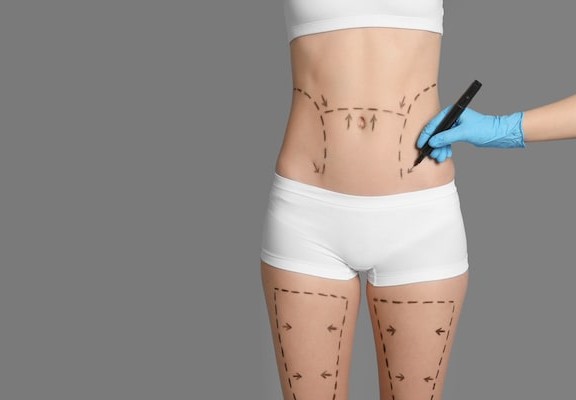One thing that all patients should know about having an elective procedure, such as liposuction, is that there are some risks involved with the surgery. While it is not always the case, there are even times when the complications can prove to be fatal. For example, the wife of country singer Hank Williams Jr., passed away in March of this year due to a collapsed lung that was revealed to be punctured while she was undergoing liposuction surgery. Here is a look at some of the risks that are involved in undergoing liposuction surgery that patients need to know about before having the procedure.
Liposuction – Possible Risks of the Surgery
 Liposuction is performed to eliminate stubborn fat on the body that is resistant to diet and exercise. A cannula is used to suction out the stubborn fat and give a better contour to the treated area of the body. Some of the most popular areas of the body that can be treated using liposuction include the buttocks, hips, waist, abdomen, and arms. Please note that liposuction is not a weight loss procedure, and it is also not a substitute for a healthy lifestyle including proper diet and exercise.
Liposuction is performed to eliminate stubborn fat on the body that is resistant to diet and exercise. A cannula is used to suction out the stubborn fat and give a better contour to the treated area of the body. Some of the most popular areas of the body that can be treated using liposuction include the buttocks, hips, waist, abdomen, and arms. Please note that liposuction is not a weight loss procedure, and it is also not a substitute for a healthy lifestyle including proper diet and exercise.
Even though this treatment might not seem to be one that would lead to issues with the lungs, there are complications that can happen anytime liposuction is performed. For example, a collapsed lung (traumatic pneumothorax) can occur thanks to any procedure that is performed around the lungs. In other words, if someone is careless or is not paying enough attention to what they are doing, they can puncture the lung by going too deep into the body with the tip of the cannula. Many people view liposuction as a very easy operation, but it is imperative that the surgeon is aware of all of the elements that are occurring during the procedure.
In addition to possible damage to the lungs, some of the other risks involved with having liposuction include scarring, nerve damage, an uneven or lumpy appearance to the treated area, hematoma (collection of blood), and seroma (collection of fluid). While it is not a certainty that these risks or complications will occur after liposuction, it is something that patients need to know about before having the procedure.
In addition, the surgeon performing the liposuction procedure needs to check for any possible heart conditions by performing an EKG, as well as coagulation profiles, before scheduling a person for the surgery.
Liposuction Safety Steps Patients Can Perform
While there are many steps that a surgeon should take before they perform liposuction, it is also important for patients to practice their own due diligence before they make a commitment to having the procedure.
Patients need to perform proper research to make sure their surgeon of choice is both board-certified and experienced in performing liposuction. This includes checking the credentials of surgeons from other countries if the patient wants to find someone to perform liposuction at a cheaper price (medical tourism). Anyone who is interested in having liposuction can check the website of the American Board of Plastic Surgery to check on the certification of the doctor of choice. It is certainly a cause for concern if the surgeon is not able to provide any type of proof of their certification. Patients also need to make sure the surgeon has hospital privileges at the medical facility (such as a hospital) where the surgery will be performed.
The choice to visit a surgeon who is not board-certified can often lead to side effects and complications that will later need to be addressed by a board-certified doctor. There are many unlicensed surgeons, who are also lacking proper training, who advertise their services because of the lucrative nature of the plastic surgery industry.
It is important to remember that there is only one medical board that certifies plastic surgeons and that is the American Board of Plastic Surgery. Patients need to make sure the plastic surgeon they have in mind is board-certified by this organization. It is also important to make sure the surgeon of choice has the proper amount of training in plastic surgery as well as general surgery and a plastic surgery fellowship.
While all of these steps and suggestions might seem like “overkill” to some people, the end goal is to ensure the safety and long-term well-being of a patient. These steps are also important because finding the answers about the medical experience, training, and background of a plastic surgeon can help to prevent any issues before they begin.
Liposuction is an effective way to eliminate fat that is hard to reduce on the body through regular diet and exercise. It is also a major surgical procedure that should not be taken lightly when it comes time to make a decision about having the treatment. A patient with the proper information about their doctor is one that can make an educated decision about having liposuction.




